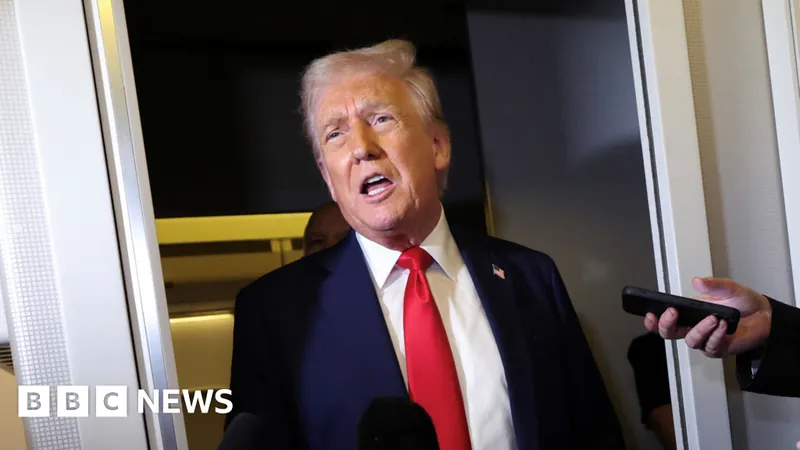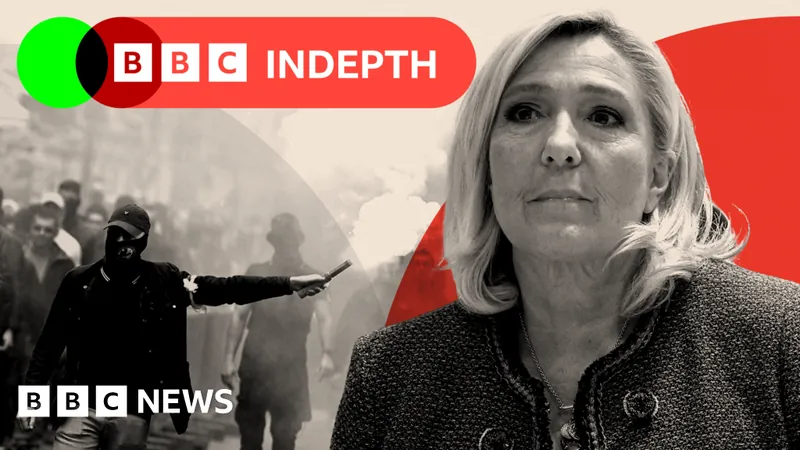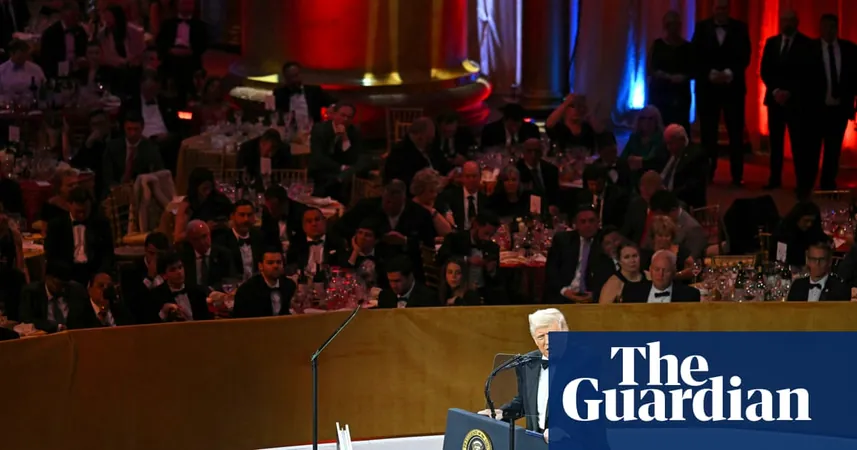
Divided We Stand: Canadian Union Leaders Rage Against UAW's Support for Trump's Auto Tariffs
2025-04-06
Author: Emily
Overview of the Situation
Union leaders from Ontario are vocally criticizing their American counterparts for backing U.S. President Donald Trump’s auto tariffs, which have already resulted in significant layoffs within the automobile sector. The United Auto Workers (UAW) union has been an ardent supporter of these tariffs, viewing them as a mechanism to revive manufacturing jobs lost over the last thirty years—a decline many attribute to the North American Free Trade Agreement (NAFTA) established in 1994.
Impact of the Tariffs
The tariffs, which took effect recently, impose a staggering 25% charge on all foreign-made vehicles entering the U.S., directly affecting Canadian imports as well. These tariffs are part of a broader approach linked to the United States-Mexico-Canada Agreement (USMCA), where only the non-U.S. component of imported vehicles is subjected to the tariff.
Concerns from Industry Experts and Union Leaders
Industry experts and union leaders are sounding alarms: these costs will lead to pricier cars for consumers and potential widespread layoffs across the sector. Just this week, Stellantis NV announced it would temporarily close an assembly plant in Windsor, Ontario, impacting roughly 3,200 workers and hinting at a ripple effect throughout the Canadian auto industry.
Reactions from Union Leaders
John D'Agnolo, president of Unifor Local 200 in Windsor, expressed his disappointment, stating, “To see UAW leadership talk about jobs returning to the U.S. without considering the Canadian auto workers impacted is a betrayal of the solidarity we’ve built as auto unions.” He further elaborated that the relationship had already been severely strained given their collective bargaining efforts with Ford earlier this year.
UAW's Silence on the Matter
Despite multiple inquiries, the UAW has yet to comment on its stance regarding the tariffs or its deteriorating relationship with Unifor. Trump's 'Liberation Day' announcement showcased support from former and current auto workers, where supporters emphasized their hardships due to free trade policies, with many expressing gratitude for the imposed tariffs.
Diverse Perspectives on the Tariffs
Chris Vitale, a former Stellantis employee and auto worker supporter, believes that despite the potential for job loss, the tariffs are a necessary step towards restoring his community's manufacturing strength. However, other union leaders warn that this perspective is dangerously naive. James Stewart, president of Unifor Local 444, raised concerns that such shortsighted thinking could backfire, leading to industry-wide shutdowns as tariffs take their toll.
Immediate Consequences for Stellantis
In a significant turn of events, Stellantis announced the halting of operations at various assembly plants due to the tariffs, including laying off 900 workers across six U.S. factories. The Windsor plant, which specializes in producing minivans and Dodge Chargers, will be closed for two weeks, demonstrating the immediate impact of these policies.
Understanding Modern Auto Manufacturing
Stewart criticized the UAW’s motivations, claiming their stance lacks an understanding of the realities of modern auto manufacturing. He emphasized that in today’s interconnected supply chain, not a single vehicle in the U.S. can be classified as entirely American-made anymore, pointing to the complexities added by decades of trade agreements.
American Workers' Perspectives
Meanwhile, the notion that these tariffs will revitalize the auto industry is gaining traction among some American workers, thanks in part to rhetoric from their union leaders and President Trump. Brian Pannebecker, founder of Auto Workers for Trump 2024, suggested that the tangible benefits would emerge in a few years, casting doubt on the immediate effects of job losses.
Canadian Auto Workers' Worries
In Canada, the implications of these tariffs are beginning to materialize, especially for plants like the one in Brampton, where retooling for electric vehicles has left many workers anxiously awaiting resumption of operations. Vito Beato, president of Unifor Local 1285, has been striving to allay fears among his members, even as he recognizes their precarious situation, with projections for a return to work potentially extending to late 2026.
Tensions and Future Relations
As tensions mount and alliances shift, Beato summed up the current sentiment: “Right now, UAW and us, we’re not friends. The gloves are off as far as I’m concerned.” As the automotive industry grapples with these new policies, the fractures between Canadian and American workers may lead to unforeseen consequences in the future.









 Brasil (PT)
Brasil (PT)
 Canada (EN)
Canada (EN)
 Chile (ES)
Chile (ES)
 Česko (CS)
Česko (CS)
 대한민국 (KO)
대한민국 (KO)
 España (ES)
España (ES)
 France (FR)
France (FR)
 Hong Kong (EN)
Hong Kong (EN)
 Italia (IT)
Italia (IT)
 日本 (JA)
日本 (JA)
 Magyarország (HU)
Magyarország (HU)
 Norge (NO)
Norge (NO)
 Polska (PL)
Polska (PL)
 Schweiz (DE)
Schweiz (DE)
 Singapore (EN)
Singapore (EN)
 Sverige (SV)
Sverige (SV)
 Suomi (FI)
Suomi (FI)
 Türkiye (TR)
Türkiye (TR)
 الإمارات العربية المتحدة (AR)
الإمارات العربية المتحدة (AR)